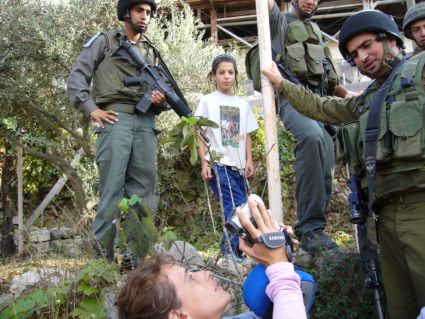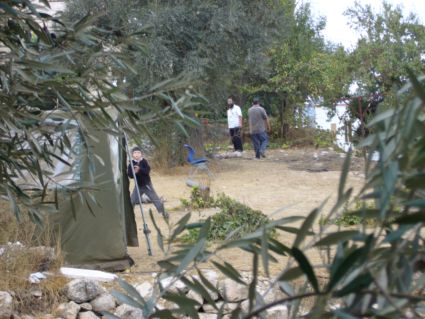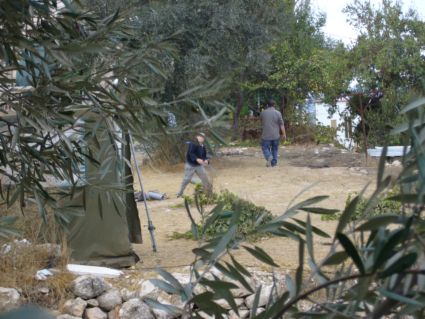by ISM Hebron
Thursday 26th October

Our Palestinian neighbour, H, lives only 2 metres away from the Tel Rumeida settlement. On Wednesday night he came over to explain to the internationals living in Tel Rumeida the situation as they had offered to help him with an olive harvest. H has experienced continual harassment from the settlers who want to force him out and occupy his house and land. They have put razor wire across a path so that he cannot access a safer way to his home and have built their own steps down onto this land so that they can work it themselves. One of the main people responsible for this is a woman who recently moved to the Tel Rumeida settlement after having been evicted from the settlements in Gaza.
Under Israeli law, if a Palestinian does not work his land for 3 years it is forfeited to the state who are then free to dispose of it as they see fit, including giving it to settlers. This was why it was so very important that the land be accessed. Extra people from the International Solidarity Movement, Christian Peacemaker Teams, Tel Rumeida Project, Rabbis for Human Rights, International Women’s Peace Service and photographers from B’Tselem all agreed to come to Tel Rumeida to help with this potentially very dangerous operation to allow H to access this land. Picking the olives was not the main objective: the most important goal was to access the land and have proof that Palestinians have worked on it.
H has a High Court order saying that Palestinians must be allowed to access and work his land. It also says that the army and police must protect them while he does so. The army agreed to allow this to happen at 13.30.
Before this planned operation, in the late morning, one international went to the start of the track from the Palestinian man’s house which leads to his olive trees. This track has been blocked by razor wire put there by the Tel Rumeida settlers to stop him accessing his own land. After a few minutes, the international was spotted by a settler woman, who started to throw rocks down at her. The settler woman was later joined by two other settler women, who also threw rocks down at the international, some of them very large. A soldier went up to the settlers at one point but did not take action about their violence and at one point he was standing shoulder-to-shoulder with one of the settler women as she threw large rocks at the international. One of the settler women was also observed gathering rocks in a blue bucket, presumably to throw at the international later and also attacked the international with a large stick and insulted and shouted at her.
Another international then approached the track and the olive trees from the Tel Rumeida road and shouted loudly at the women to stop throwing stones at the international. A woman settler then came up to her very aggressively and told her to go away. When the international refused and told the settler that it wasn’t the settler’s land to be on, the settler demanded to see the international’s passport. The international refused to do this, and asked what the settler’s religion had to say about throwing stones at people and trying to steal their land. The settler shouted that it was the international and her religion who were responsible for the Holocaust. When challenged by the international to explain this, the settler started aggressively pushing the international down the hill away from the settlement. At one point another settler woman joined her, and both pushed and assaulted the international, at one point bending the international’s fingers back to make her let go of a wire fence she was holding onto. At this point the police arrived, but instead of attempting to restrain the attacking settler women, they removed the international down the hill, but not before a settler woman spat once in the international’s face and once in her hair. The police, and the two soldiers present, took no action about any of this.
Other internationals had filmed the stone throwing and assaults but although they showed this clear footage to the police, the police insisted that they could not take any immediate action but that the internationals would have to go to Kiryat Arba police station in order to make a complaint, a constant refrain, despite the fact that they are legally supposed to take complaints at the scene of a crime and make arrests immediately. One of the policemen said that he knew one of the settler women because she had assaulted many people in the past. However they took no action.
At 1pm the international’s gathered at H’s house. A large group from Belgium were there doing a tour of the West Bank and H was explaining to them his situation. At 1.40 H led the whole group onto the land around the razor wire. They began to pick olives and to dig the ground around the trees. One group worked at clearing the razor wire from the path and clearing away the vines so that the path was open again.
10 minutes after the Palestinians entered the land, settlers came down the staircase from the settlement. They sat or stood under the olive trees reading the Torah. Soldiers were at the top by the settlement. Three women came down, one with a baby on her hip. They began to shout, saying that this is their land. H has documents to prove Palestinian ownership of the land. When the woman was asked to produce her papers she said the Bible gave her ownership of this land. She very recently moved to Tel Rumeida having been evicted from Gaza. Soldiers came down onto the land and stood among the crowd instead of removing the settlers.
A settler then began shouting at Issa, a Palestinian man who joined the olive harvest, telling him not to work the land and the suddenly hit Issa very hard on the left cheek.
Instead of stopping the settlers’ attacks and removing them, the soldiers ordered all the internationals to leave the land. H asked the internationals to leave for a few minutes. As the internationals were leaving, a settler youth jumped from a wall to attack them. A soldier picked him up, using a Hebrew term of endearment, and moved him away.
Eventually, after a lot of arguing with the soldiers all the internationals left the land. The settlers went back up the stairs and the Palestinians returned to work on their own, the children climbing the trees and the adults picking the olives.
Ten minutes later the three settler women came back down to the land and began to shout at H and the Palestinians. They seemed very aggressive. A settler woman holding a baby attacked H’s 13 year old niece, kicking her. H then called for the internationals to come back which they did.
Again, the soldiers focused on removing the internationals, trying to get them to leave the land, but they refused unless the settlers were removed out of fear for the Palestinians’ safety. The soldiers refused to remove the settlers and the police did not get involved. The internationals all sat down in a group. The settler women were walking around and throwing water from bottles onto various people. One international woman with a video camera was drenched.
The same settler youth from the earlier attack, again jumped off the wall, this time directly onto an international cameraman who the settler began kicking and hitting profusely. After falling off the cameraman, the settler youth ran after him down the path, trying to attack him again. The settler youth was again picked up and removed by a soldier who shook the youth’s hand as he was carrying him away.
H asked all internationals to return to his house and he decided to stay off the land for a few minutes until the situation calmed down. He returned repeatedly to the land throughout the afternoon with his family and other Palestinians and they continued to work the land and pick the olives.
Although he was not able to do all the work he wanted to H was very happy at the end of the day. He has achieved his main objective of asserting his right to work the land and has video proof that this has happened. There is also video evidence of settlers trespassing and assaulting a Palestinian as he attempted to work the land. There will be a court case to charge the settler with assault and this will bring additional pressure about the ongoing theft of Palestinian land.
Friday 27th October
Nine HRWs (two from TRP, two from ISM, four from CPT, one from IWPS) – met a Palestinian at the Siyaj family’s home at 8am. By 9am the family members started to arrive with the materials to begin the olive harvest; the HRWs and a fluctuating number of Palestinians ranging from two to eight including children and young men, began harvesting olives from the two trees closest to the home but furthest from the settlement and military outpost. The first few hours were peaceful and productive: some people helped knock olives out of the tree with sticks and others gathered the olives from the catch-blankets below. The trees seemed to have an endless amount of olives which were piled in large woven plastic bags. At approximately 10am, just as soon as some Siyaj family members offered everyone tea and Eid cakes and people began to relax from their work, a stone was thrown by a young male settler (age 18-25). He lingered on the side of the house closest to the settlement until multiple HRWs turned on their video cameras and four or five soldiers arrived, at which point he retreated to the settlement. Paying no attention to the settler, the soldiers walked straight towards the Palestinian men near the olive trees; HRWs followed with cameras. A Palestinian presented “The Right to Access Agricultural Lands” document to the soldiers, who agreed to speak with a Palestinian once the HRWs turned off their video cameras. After reading the document they said we could continue harvesting as we were, as long as we did not film, so the harvesting proceeded. The soldiers stayed nearby and were soon joined by a few police who did not approach the harvesting group.
At approximately 11:30am another HRW arrived and was directed to help the Abu Heikel family with their harvest. Not long after the HRW left for the Au Heikel home, several soldiers left the area and moved towards the home; one HRW followed. At the house, the soldiers initially told the family they would have to stop harvesting as they were in a closed military zone. Soldiers were shown the order of the Israeli High Court guaranteeing Palestinians access to their land and requiring the army to protect this right, but still attempted to stop the harvesting. HRWs made phone called to the Israeli DCO (District Co-ordination Office), and some moments later further soldiers arrived and spoke to their colleagues, after which time the family were able to continue harvesting for the rest of the day, with HRWs, soldiers and at times Police and Border Police present. There were no incidents involving settlers.
At the Siyaj home, the harvesting continued smoothly until the group completed the harvesting of the first two trees and moved to the side of the house closer to the settlement to begin harvesting two more trees. Again, the harvesting began peacefully and productively – people were enjoying the work and there was much laughter. Sometime around 1:30pm another settler threw a stone: this time it was a boy (age 10-13) who threw the stone from the settlement yard and was captured on film (see attached photographs A and B). The HRW who photographed the boy was in the tree harvesting olives so he shouted to the special police as two other HRWs grabbed their video cameras. The special police and local police slowly came to where the HRW stood with two Palestinian men who were reviewing the photographs. The police recognized Baruch Marzel and the boy from the photograph and went to the settlement, presumably to speak to them, but the results of this are unknown.
Two special police men stayed at the house and observed from the porch as the group continued to harvest olives. Abu Siyaj brought pita bread with cheese to all the people harvesting olives, which now consisted of four HRWs and six to eight Palestinians, mostly children and teenagers. The harvesting continued uninterrupted until just before 4pm, as we began to pack up the catch-blankets, when the HRWs in the trees noticed the settler children in their yard with a bucket which had been used the day before to hold stones for throwing. The HRWs drew this to the attention of the police on the porch, who then stepped off the porch onto the stairs where they were visible to the children who seemed to change their posture slightly once they saw them. A man joined the children and after standing around for five minutes or so, walked back towards the home with the children at hand. The children remained outside, waving and staring at the HRWs in the trees, and began climbing a tree. After 10 minutes are so, three settler boys came down the path and picked olives from a Siyaj family tree while the police stood nearby, doing nothing in response to their actions. The HRWs remained in the trees with cameras on and photographed as the family finished packing up to leave. Everyone departed without problems.
Saturday 28th October
Today was rainy and cold and perhaps less active because of it. When the two international arrived on Shuhada street the Police jeep was at checkpoint 56 and police were asking young Palestinian men for identification after they came through the checkpoint. They briefly stopped four men before driving away shortly after noon. At 3 pm a young male settler (age 14 – 18) walked by two HRWs and attempted to spit at them, but spit on himself instead. A few minutes later a young Palestinian boy (age 5-9) who we see often on Shuhada street walked by alone, holding a plastic bag. He was much less cheerful than usual, and did not stop when the HRW said hello. He walked on with a very serious look on his face, and the HRWs walked slowly behind as he walked towards the Qurtuba School steps. When he came close to the stairs, he picked up his pace and ran around the corner before the HRWs made it to the corner, and before they did, the boy ran back onto the street chased by five to seven settler boys. The HRWs went towards the settlers with a camera and the soldier walked from his post into the street. The settlers just lingered and made faces until walking back towards the settlement. The HRWs asked the boy if he wanted them to walk with him – he looked very frustrated and said no, even when asked by TIPH – he explained that he wanted to walk around the long way. Later, the HRWs saw him without the bag; hopefully he delivered it successfully.
At 3:30pm two young settler women (ages 14-18) had a verbal confrontation with an older Palestinian woman. The HRWs ran towards them shouting at the soldier and the soldier walked to them just as the settlers left the woman alone. At 4:45 two young settler men and a Palestinian man began a verbal confrontation that looked as though it could become physical but a soldier from checkpoint 56 walked to them and broke it up. The settlers and the Palestinian walked away, both still saying things loudly to each other. The same soldier then proceeded to make the checkpoint more pleasant by throwing stones into the puddle and then placing cardboard on top so the Palestinians would not have to walk in the mud. The HRWs said thank you as they left the street and headed home.
The Al Azzeh family suffered further deprivation today. Probably during the night, their water pipes were smashed where they pass, on the road, by the Tel Rumeida. This is the fifth time that the pipes have been cut, within the last 2 months. In this time no one has been arrested for this offence. This has occurred even though the Israeli command has cameras covering the area. Israeli soldiers constantly restrict Palestinian and International movement in the locality of the Tel Rumeida settlement. They justify this because of the proximity of the military base. In spite of this, the DCO claim that a cut water pipe, in a location to which Palestinians and Internationals do not have access, is not their responsibility. Cut razor wire on Palestinian land is however! As happened yesterday, the wire must be replaced by bare handed Palestinians under threat of arrest! Israeli settlers or soldiers, who destroy part of the water pipe, are allowed freedom do repeat their offense time and time again.



